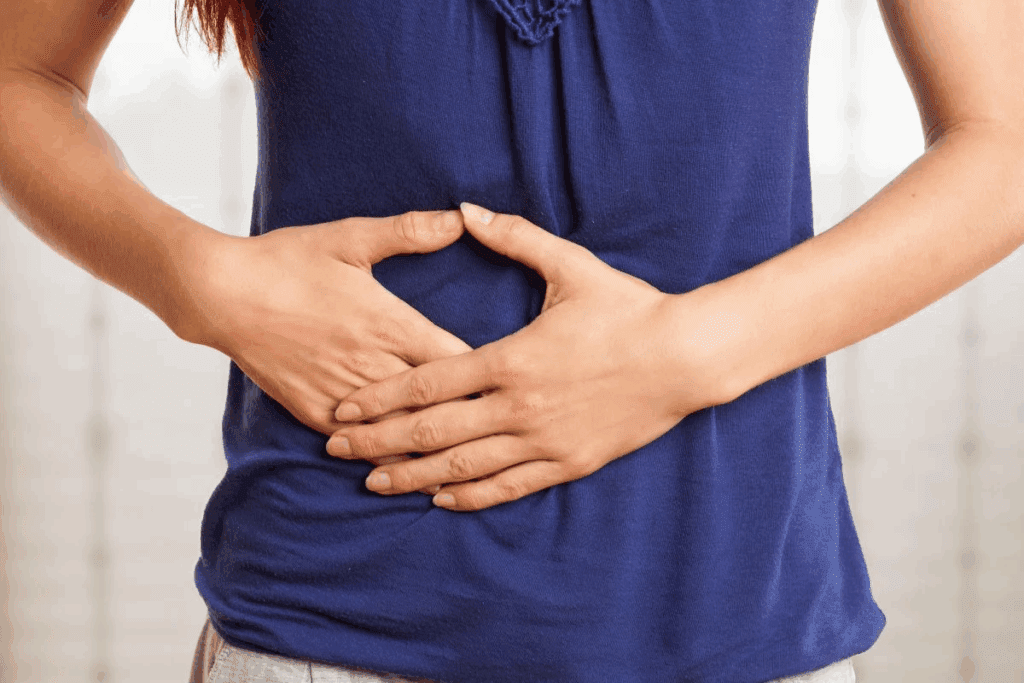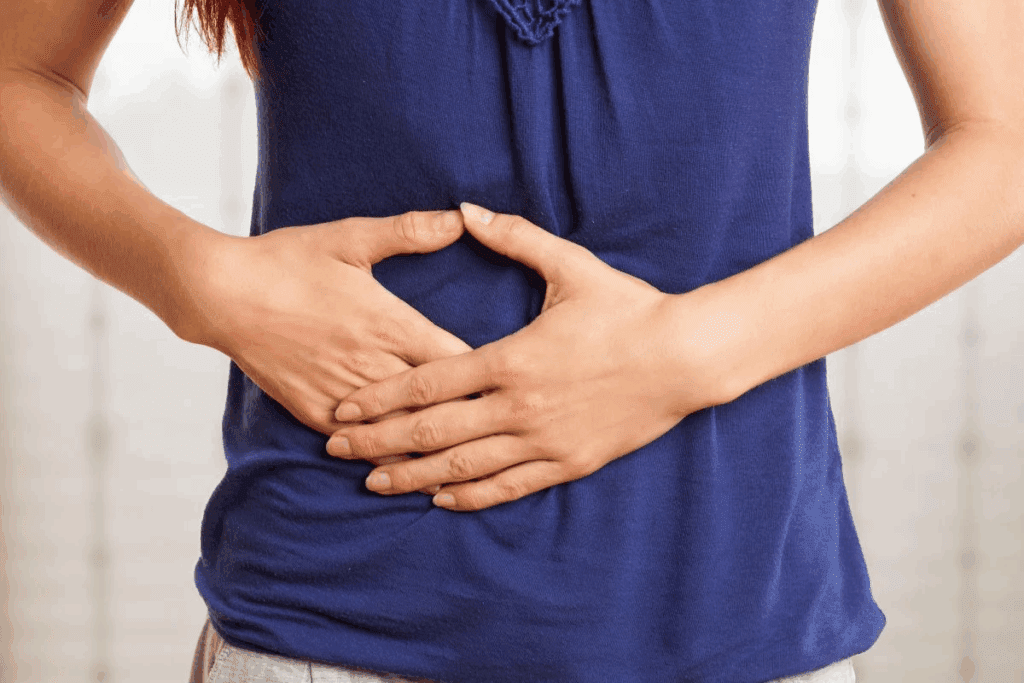
After having your gallbladder removed, you might wonder if it’s okay to drink alcohol. The liver continues to produce bile, but without the gallbladder, the process of digesting fats and handling alcohol changes. This can affect how your body responds to alcoholic beverages.
So, can you drink alcohol after gallbladder removal? Most doctors recommend waiting at least two weeks before drinking again. This gives your body time to heal and reduces the risk of digestive discomfort or other complications.
Understanding these changes helps you make smarter choices about your health. Hospitals like Liv Hospital provide expert guidance to help patients recover safely and adjust to life after gallbladder surgery.
Key Takeaways
- Waiting at least two weeks after gallbladder removal surgery is recommended before consuming alcohol.
- The absence of a gallbladder can affect how the body processes alcohol.
- Understanding the risks associated with alcohol consumption post-surgery is critical.
- Guidelines for safe alcohol consumption after gallbladder removal will be discussed.
- It’s essential to consider individual health and consult with a healthcare provider.
Understanding Gallbladder Removal Surgery

Gallbladder removal surgery, also called cholecystectomy, is a common treatment for gallstones and other gallbladder diseases. It’s done to ease symptoms caused by gallbladder problems. These symptoms can really affect a person’s life quality.
Common Reasons for Gallbladder Removal
The main reason for gallbladder removal surgery is gallstones. These are small, hard deposits in the gallbladder. Other reasons include:
- Gallbladder inflammation (cholecystitis)
- Gallbladder polyps
- Gallbladder cancer
- Biliary dyskinesia, a condition where the gallbladder doesn’t function properly
These conditions can cause severe pain, nausea, and other complications. So, removing the gallbladder is often the best treatment.
Types of Gallbladder Surgery: Laparoscopic vs. Open
Gallbladder removal surgery can be done in two ways: laparoscopic surgery and open surgery.
Laparoscopic Surgery:
- Minimally invasive, with several small incisions
- Uses a laparoscope (a thin, lighted tube with a camera) to see the gallbladder
- Usually leads to less pain and a quicker recovery than open surgery
Open Surgery:
- Needs a single, larger incision to directly access the gallbladder
- Recommended for complex cases or certain complications
- Generally means a longer recovery time
The Role of the Gallbladder in Digestion
The gallbladder stores bile, a fluid from the liver that helps break down fats. When food reaches the small intestine, the gallbladder releases bile into the bile duct. This bile then goes to the intestine to help digest fats.
Even though the gallbladder isn’t essential for digestion, removing it can change how the body processes fats. It might also affect how well the body can handle alcohol.
How Gallbladder Removal Affects Your Body

Gallbladder removal surgery, or cholecystectomy, leads to changes in how we digest food. Without the gallbladder, our body has to adjust how it makes and stores bile. This affects digestion and how we absorb nutrients.
Changes in Digestive Function
After surgery, people might notice changes in how they digest food. The gallbladder stores bile from the liver and releases it into the small intestine. This helps digest fats. Without it, bile goes straight to the small intestine, which can cause digestive discomfort or diarrhea.
A study in the Journal of Clinical Gastroenterology found that without a gallbladder, bile flows constantly into the intestine. This can lead to stomach problems in some patients.
Bile Production and Storage Without a Gallbladder
The liver keeps making bile, but its storage and release change without a gallbladder. This can make fat digestion less efficient and affect nutrient absorption.
- Bile salts might not be as concentrated, which can hurt fat digestion.
- The constant flow of bile into the intestine can irritate and cause discomfort.
Common Post-Surgery Digestive Adjustments
People might need to change their diet after surgery to handle digestive changes. This could mean eating smaller, more frequent meals and avoiding fatty foods. As one patient said, “After my surgery, I had to completely change my eating habits to manage the digestive issues.”
It’s important to watch and adjust to these changes to keep your digestive system healthy after gallbladder removal.
The Relationship Between Alcohol and Digestion
It’s important to know how alcohol and digestion work together, even more so for those without a gallbladder. Without a gallbladder, the body processes alcohol and food differently.
How Alcohol is Processed in the Body
Alcohol is mainly broken down by the liver. When we drink alcohol, it goes into our bloodstream and then to the liver. There, enzymes turn it into acetaldehyde and then into acetate. This acetate is broken down into water and carbon dioxide.
The liver can only handle so much alcohol. Drinking too much can hurt the liver and damage liver cells. “The liver is a vital organ that plays a central role in alcohol metabolism, and its health is key for well-being,” experts say.
The Liver’s Role in Alcohol Metabolism
The liver is key in breaking down alcohol. It uses enzymes like alcohol dehydrogenase to turn alcohol into acetaldehyde. How well the liver can handle alcohol is important for avoiding alcohol’s bad effects.
- The liver metabolizes alcohol at a fixed rate.
- Too much alcohol can overwhelm the liver.
- Liver health is vital for alcohol breakdown.
Impact of Alcohol on Digestive Processes
Drinking alcohol can harm digestion. It can irritate the stomach, causing inflammation and possibly gastritis. Also, alcohol makes it harder for the body to absorb nutrients, leading to nutritional deficiencies.
It’s vital to be careful with alcohol and know its effects on digestion, even more so after gallbladder removal. This helps avoid complications.
Can You Drink Alcohol After Gallbladder Removal?
Drinking alcohol after gallbladder removal is a complex issue. It depends on many factors. Most doctors agree that a little alcohol is okay after recovery. But, how much you can handle and your health are key.
General Medical Consensus
Doctors mostly say it’s safe to have a bit of alcohol after gallbladder surgery. But, what’s “a bit” can vary. Moderate drinking is about one drink a day for women and two for men.
Short-term vs. Long-term Considerations
Right after surgery, your body is healing. Alcohol might slow this down. It’s best to skip alcohol during the first recovery time. This time can change based on your surgery and how you heal.
Looking ahead, not having a gallbladder changes how you digest alcohol. Bile goes straight to your small intestine. This can change how you process alcohol.
Individual Factors That Affect Tolerance
Many things can change how you handle alcohol after gallbladder surgery. Your health, other medical conditions, and genes are important. Here’s a table of these factors:
| Factor | Influence on Alcohol Tolerance |
| Age | Older individuals may experience decreased tolerance. |
| Overall Health | Presence of other health issues can affect alcohol metabolism. |
| Genetic Predisposition | Genetic factors can influence how alcohol is processed. |
| Type of Surgery | The method of gallbladder removal (laparoscopic vs. open) can impact recovery and potentially alcohol tolerance. |
Knowing these factors helps you decide about drinking after gallbladder surgery. Always talk to a doctor for advice that fits you.
Recommended Waiting Period Before Consuming Alcohol
Knowing when to start drinking alcohol again after gallbladder surgery is key. It helps avoid problems. The recovery time depends on the surgery type.
Recovery Timeline After Laparoscopic Surgery
Laparoscopic surgery is less invasive, leading to quicker recovery. Most people can get back to normal in a few days to a week. It’s best to wait 2 to 4 weeks before drinking alcohol to let your body fully heal.
Recovery Timeline After Open Surgery
Open surgery is more invasive and takes longer to recover from. Patients might need 6 to 8 weeks or more to fully heal. This longer wait helps your body recover and lowers the risk of problems.
Why Timing Matters for Alcohol Consumption
When you start drinking alcohol after surgery is very important. Alcohol can slow down healing. Drinking too soon can cause infections, slow healing, and bad reactions to medicines. It’s vital to focus on your health and wait the recommended time for a safe recovery.
Potential Risks of Drinking Too Soon After Surgery
Drinking alcohol too early after gallbladder surgery can harm your recovery. Your body is weak after surgery. Alcohol can make healing harder.
Interference with Healing Process
Alcohol can mess with your body’s healing ways. It hurts your liver’s work, which is key for fixing tissues and processing meds. Drinking too soon can make recovery take longer.
Medication Interactions
After surgery, you might take meds for pain or to prevent infection. Alcohol can mix badly with these meds. This can cause side effects like feeling very sleepy or dizzy. Always listen to your doctor about drinking while on meds.
Increased Risk of Complications
Drinking too soon after surgery can lead to more problems. These might include:
- Bleeding or hemorrhage
- Infection
- Delayed healing
- Digestive issues, such as diarrhea or stomach pain
Wait until your doctor says it’s okay to drink. They know how you’re doing and can give you the right advice.
In short, drinking too soon after gallbladder surgery is risky. It’s important to put your health first and follow your doctor’s advice for a safe recovery.
Different Types of Alcoholic Beverages and Their Effects
After having your gallbladder removed, different drinks can affect your stomach in different ways. Knowing how they differ is key to picking drinks that won’t upset your stomach.
Beer and Carbonated Alcoholic Drinks
Beer and drinks with carbonation can be tough on your stomach after gallbladder surgery. The fizz can make you feel bloated, and beer’s hops might upset your stomach too. Watch how your body reacts to these drinks.
Key considerations for beer and carbonated drinks:
- Carbonation can cause bloating and discomfort
- Hops may irritate the digestive system
- Start with small amounts to gauge tolerance
Wine and Its Impact
Wine, like red wine, has tannins that can mess with digestion. But, wine might be a better choice than beer or fizzy drinks because it has less fizz. Red wine’s antioxidants could be good for you, but drink it in small amounts.
Notable points about wine consumption:
- Red wine contains antioxidants that may be beneficial
- Tannins can affect digestive processes
- Moderation is key to avoiding adverse effects
Spirits and Hard Liquors
Spirits and hard liquors are strong and can really upset your stomach. Their high alcohol content can irritate your stomach lining, causing discomfort. Mixing them with other drinks can also change how your body reacts.
Guidelines for consuming spirits:
- Choose clear spirits like vodka or gin, which may be less irritating than dark liquors
- Avoid mixing with carbonated beverages
- Drink slowly and in moderation
Best Alcohol Choices After Gallbladder Removal
Everyone’s body is different, but some drinks are generally easier on the stomach after gallbladder surgery. Clear spirits mixed with non-fizzy juices or water are a good pick. Stay away from drinks with lots of sugar or artificial stuff.
Recommendations for alcohol choices:
- Opt for clear spirits
- Avoid carbonated mixers
- Choose drinks with minimal additives
Guidelines for Safe Alcohol Consumption Post-Recovery
It’s important to know the rules for drinking after your gallbladder surgery. Your body is adjusting to new ways of digesting food. Drinking alcohol should be done carefully.
Recommended Limits for Men and Women
For most adults, drinking up to one drink a day is okay for women. Men can have up to two drinks daily. Following these limits helps avoid alcohol problems, which is key after gallbladder surgery.
Gradual Reintroduction Strategies
Start slow when you begin drinking again. Start with a little and watch how you feel. This way, you can spot any bad reactions early.
- Begin with a small amount (1/2 drink) to test tolerance.
- Observe how your body reacts over the next few hours.
- Gradually increase the amount if no adverse effects are observed.
Monitoring Your Body’s Response
It’s important to watch how your body reacts to alcohol after surgery. Signs like stomach pain, diarrhea, or feeling more sensitive to alcohol are serious. If you notice any severe or lasting symptoms, talk to your doctor.
“The key to safe alcohol consumption after gallbladder removal is moderation and awareness of your body’s response.”
By sticking to these guidelines and being careful with your drinking, you can stay safe and recover well.
Common Symptoms When Drinking Without a Gallbladder
Not having a gallbladder changes how the body handles alcohol. People who had their gallbladder removed might feel different when drinking. They might notice various symptoms.
Digestive Discomfort and Diarrhea
Digestive issues are common, like bloating, cramps, or diarrhea. The gallbladder helps with bile, a key digestive fluid. Without it, bile goes straight to the intestine, which can mess with digestion.
Drinking alcohol can make these problems worse. It can upset the stomach and mess with bowel movements. Many people with no gallbladder get diarrhea after drinking because their body can’t handle alcohol well.
Changes in Alcohol Tolerance
After losing the gallbladder, many notice they can’t drink as much. Even small amounts of alcohol can have stronger effects. This is because digestion changes and the liver works harder to process alcohol.
- Reduced tolerance to alcohol
- Increased sensitivity to alcohol’s effects
- Potential for heightened intoxication
Warning Signs That Require Medical Attention
Some symptoms are common but need attention. Severe stomach pain, constant diarrhea, or dehydration signs are serious. These could mean there’s a bigger problem.
“If you experience severe symptoms after drinking alcohol without a gallbladder, it’s vital to get medical help. This ensures there are no serious issues.”
Knowing these symptoms and being careful can help people drink safely after gallbladder removal.
Dietary Considerations When Consuming Alcohol
After having your gallbladder removed, what you eat is very important. Without a gallbladder, your body can’t digest fats as well. This makes it harder to handle alcohol. So, choosing the right foods is key to feeling better.
Foods to Pair with Alcohol
Drinking alcohol can be easier if you eat the right foods. Nutrient-rich foods like lean proteins, whole grains, and veggies help your stomach. For example, eating foods high in fiber, like oatmeal or bananas, can slow down how fast alcohol gets into your system.
A health expert once said:
“Eating a balanced meal before drinking can significantly reduce the risk of adverse reactions.”
Foods to Avoid When Drinking
Some foods can make alcohol’s effects worse, even more so after gallbladder removal. Stay away from high-fat foods and spicy dishes as they can upset your stomach. Greasy foods are also hard for your body to digest when you’re drinking.
- High-fat foods like fried foods and rich sauces
- Spicy foods that can irritate the digestive tract
- Carbonated drinks that can cause bloating
Hydration and Nutritional Support
It’s important to drink lots of water when you’re drinking alcohol. Alcohol can dry you out. Drinking plenty of water before, during, and after can help. Also, eating a balanced diet gives your body what it needs to handle alcohol better.
By paying attention to what you eat and drink lots of water, you can handle alcohol better after gallbladder removal. This helps avoid feeling uncomfortable.
Conclusion
Drinking alcohol after gallbladder removal needs careful thought. It’s important to weigh the risks and follow safe drinking guidelines. Each person’s tolerance is different, so it’s key to consider this when deciding to drink.
Knowing the guidelines and risks is vital. It’s best to wait a bit before drinking. This helps avoid problems like slowing down healing and reacting badly to alcohol.
To drink safely after gallbladder removal, stick to recommended amounts. Start with small amounts and watch how your body reacts. Also, think about what you eat with your drinks. Being informed and careful helps avoid health issues and lets you enjoy life again.
In summary, a balanced approach is best when it comes to drinking after gallbladder removal. Mix caution with responsible drinking to stay healthy and happy.
FAQ
Can you drink alcohol after gallbladder removal?
Yes, you can drink alcohol after gallbladder removal. But, wait for a bit before you start. The time you should wait depends on your surgery type and how you’re healing.
How long should I wait to drink alcohol after gallbladder surgery?
For laparoscopic surgery, wait a few days to a week. Open surgery might need a longer wait, often weeks. Always listen to what your doctor says.
What are the risks of drinking alcohol too soon after gallbladder removal?
Drinking too soon can slow healing and mix badly with meds. It also ups the chance of complications.
Can you drink alcohol without a gallbladder?
Drinking alcohol without a gallbladder is possible. But, you might need to watch how your body reacts. Without a gallbladder, digestion and alcohol tolerance can change.
What type of alcohol is best to drink after gallbladder removal?
Some drinks are easier to handle than others. Opt for low-sugar, low-carbonated ones. Avoid drinks that upset your stomach.
How can I minimize discomfort when drinking alcohol after gallbladder removal?
Drink in moderation and eat before or while drinking. Choose drinks with less sugar and carbonation. Stay hydrated to avoid discomfort.
What are the common symptoms when drinking alcohol without a gallbladder?
You might feel stomach discomfort, diarrhea, or notice changes in how alcohol affects you. If symptoms are bad or last a long time, see a doctor.
Are there specific dietary considerations when consuming alcohol after gallbladder removal?
Yes, eat foods that are easy on your stomach with alcohol. Avoid fatty foods and stay hydrated. This helps your body digest better.
Can drinking alcohol after gallbladder removal lead to long-term health issues?
Drinking too much alcohol can harm your health, with or without a gallbladder. Drink responsibly and listen to how your body reacts.
Why can’t you drink alcohol after gallbladder removal?
You can drink alcohol, but be careful. Without a gallbladder, digestion and bile release change. Follow guidelines to avoid problems.

After having your gallbladder removed, you might wonder if it’s okay to drink alcohol. The liver keeps making bile, but without a gallbladder, fat and alcohol processing changes. This can impact how your body handles these substances.
Most doctors say to wait at least two weeks before drinking alcohol again. This allows your body to heal and lowers the chance of complications. Knowing the risks and guidelines for drinking after surgery is key to making good health choices.
Key Takeaways
- Waiting at least two weeks after gallbladder removal surgery is recommended before consuming alcohol.
- The absence of a gallbladder can affect how the body processes alcohol.
- Understanding the risks associated with alcohol consumption post-surgery is critical.
- Guidelines for safe alcohol consumption after gallbladder removal will be discussed.
- It’s essential to consider individual health and consult with a healthcare provider.
Understanding Gallbladder Removal Surgery

Gallbladder removal surgery, also called cholecystectomy, is a common treatment for gallstones and other gallbladder diseases. It’s done to ease symptoms caused by gallbladder problems. These symptoms can really affect a person’s life quality.
Common Reasons for Gallbladder Removal
The main reason for gallbladder removal surgery is gallstones. These are small, hard deposits in the gallbladder. Other reasons include:
- Gallbladder inflammation (cholecystitis)
- Gallbladder polyps
- Gallbladder cancer
- Biliary dyskinesia, a condition where the gallbladder doesn’t function properly
These conditions can cause severe pain, nausea, and other complications. So, removing the gallbladder is often the best treatment.
Types of Gallbladder Surgery: Laparoscopic vs. Open
Gallbladder removal surgery can be done in two ways: laparoscopic surgery and open surgery.
Laparoscopic Surgery:
- Minimally invasive, with several small incisions
- Uses a laparoscope (a thin, lighted tube with a camera) to see the gallbladder
- Usually leads to less pain and a quicker recovery than open surgery
Open Surgery:
- Needs a single, larger incision to directly access the gallbladder
- Recommended for complex cases or certain complications
- Generally means a longer recovery time
The Role of the Gallbladder in Digestion
The gallbladder stores bile, a fluid from the liver that helps break down fats. When food reaches the small intestine, the gallbladder releases bile into the bile duct. This bile then goes to the intestine to help digest fats.
Even though the gallbladder isn’t essential for digestion, removing it can change how the body processes fats. It might also affect how well the body can handle alcohol.
How Gallbladder Removal Affects Your Body

Gallbladder removal surgery, or cholecystectomy, leads to changes in how we digest food. Without the gallbladder, our body has to adjust how it makes and stores bile. This affects digestion and how we absorb nutrients.
Changes in Digestive Function
After surgery, people might notice changes in how they digest food. The gallbladder stores bile from the liver and releases it into the small intestine. This helps digest fats. Without it, bile goes straight to the small intestine, which can cause digestive discomfort or diarrhea.
A study in the Journal of Clinical Gastroenterology found that without a gallbladder, bile flows constantly into the intestine. This can lead to stomach problems in some patients.
Bile Production and Storage Without a Gallbladder
The liver keeps making bile, but its storage and release change without a gallbladder. This can make fat digestion less efficient and affect nutrient absorption.
- Bile salts might not be as concentrated, which can hurt fat digestion.
- The constant flow of bile into the intestine can irritate and cause discomfort.
Common Post-Surgery Digestive Adjustments
People might need to change their diet after surgery to handle digestive changes. This could mean eating smaller, more frequent meals and avoiding fatty foods. As one patient said, “After my surgery, I had to completely change my eating habits to manage the digestive issues.”
It’s important to watch and adjust to these changes to keep your digestive system healthy after gallbladder removal.
The Relationship Between Alcohol and Digestion
It’s important to know how alcohol and digestion work together, even more so for those without a gallbladder. Without a gallbladder, the body processes alcohol and food differently.
How Alcohol is Processed in the Body
Alcohol is mainly broken down by the liver. When we drink alcohol, it goes into our bloodstream and then to the liver. There, enzymes turn it into acetaldehyde and then into acetate. This acetate is broken down into water and carbon dioxide.
The liver can only handle so much alcohol. Drinking too much can hurt the liver and damage liver cells. “The liver is a vital organ that plays a central role in alcohol metabolism, and its health is key for well-being,” experts say.
The Liver’s Role in Alcohol Metabolism
The liver is key in breaking down alcohol. It uses enzymes like alcohol dehydrogenase to turn alcohol into acetaldehyde. How well the liver can handle alcohol is important for avoiding alcohol’s bad effects.
- The liver metabolizes alcohol at a fixed rate.
- Too much alcohol can overwhelm the liver.
- Liver health is vital for alcohol breakdown.
Impact of Alcohol on Digestive Processes
Drinking alcohol can harm digestion. It can irritate the stomach, causing inflammation and possibly gastritis. Also, alcohol makes it harder for the body to absorb nutrients, leading to nutritional deficiencies.
It’s vital to be careful with alcohol and know its effects on digestion, even more so after gallbladder removal. This helps avoid complications.
Can You Drink Alcohol After Gallbladder Removal?
Drinking alcohol after gallbladder removal is a complex issue. It depends on many factors. Most doctors agree that a little alcohol is okay after recovery. But, how much you can handle and your health are key.
General Medical Consensus
Doctors mostly say it’s safe to have a bit of alcohol after gallbladder surgery. But, what’s “a bit” can vary. Moderate drinking is about one drink a day for women and two for men.
Short-term vs. Long-term Considerations
Right after surgery, your body is healing. Alcohol might slow this down. It’s best to skip alcohol during the first recovery time. This time can change based on your surgery and how you heal.
Looking ahead, not having a gallbladder changes how you digest alcohol. Bile goes straight to your small intestine. This can change how you process alcohol.
Individual Factors That Affect Tolerance
Many things can change how you handle alcohol after gallbladder surgery. Your health, other medical conditions, and genes are important. Here’s a table of these factors:
| Factor | Influence on Alcohol Tolerance |
| Age | Older individuals may experience decreased tolerance. |
| Overall Health | Presence of other health issues can affect alcohol metabolism. |
| Genetic Predisposition | Genetic factors can influence how alcohol is processed. |
| Type of Surgery | The method of gallbladder removal (laparoscopic vs. open) can impact recovery and potentially alcohol tolerance. |
Knowing these factors helps you decide about drinking after gallbladder surgery. Always talk to a doctor for advice that fits you.
Recommended Waiting Period Before Consuming Alcohol
Knowing when to start drinking alcohol again after gallbladder surgery is key. It helps avoid problems. The recovery time depends on the surgery type.
Recovery Timeline After Laparoscopic Surgery
Laparoscopic surgery is less invasive, leading to quicker recovery. Most people can get back to normal in a few days to a week. It’s best to wait 2 to 4 weeks before drinking alcohol to let your body fully heal.
Recovery Timeline After Open Surgery
Open surgery is more invasive and takes longer to recover from. Patients might need 6 to 8 weeks or more to fully heal. This longer wait helps your body recover and lowers the risk of problems.
Why Timing Matters for Alcohol Consumption
When you start drinking alcohol after surgery is very important. Alcohol can slow down healing. Drinking too soon can cause infections, slow healing, and bad reactions to medicines. It’s vital to focus on your health and wait the recommended time for a safe recovery.
Potential Risks of Drinking Too Soon After Surgery
Drinking alcohol too early after gallbladder surgery can harm your recovery. Your body is weak after surgery. Alcohol can make healing harder.
Interference with Healing Process
Alcohol can mess with your body’s healing ways. It hurts your liver’s work, which is key for fixing tissues and processing meds. Drinking too soon can make recovery take longer.
Medication Interactions
After surgery, you might take meds for pain or to prevent infection. Alcohol can mix badly with these meds. This can cause side effects like feeling very sleepy or dizzy. Always listen to your doctor about drinking while on meds.
Increased Risk of Complications
Drinking too soon after surgery can lead to more problems. These might include:
- Bleeding or hemorrhage
- Infection
- Delayed healing
- Digestive issues, such as diarrhea or stomach pain
Wait until your doctor says it’s okay to drink. They know how you’re doing and can give you the right advice.
In short, drinking too soon after gallbladder surgery is risky. It’s important to put your health first and follow your doctor’s advice for a safe recovery.
Different Types of Alcoholic Beverages and Their Effects
After having your gallbladder removed, different drinks can affect your stomach in different ways. Knowing how they differ is key to picking drinks that won’t upset your stomach.
Beer and Carbonated Alcoholic Drinks
Beer and drinks with carbonation can be tough on your stomach after gallbladder surgery. The fizz can make you feel bloated, and beer’s hops might upset your stomach too. Watch how your body reacts to these drinks.
Key considerations for beer and carbonated drinks:
- Carbonation can cause bloating and discomfort
- Hops may irritate the digestive system
- Start with small amounts to gauge tolerance
Wine and Its Impact
Wine, like red wine, has tannins that can mess with digestion. But, wine might be a better choice than beer or fizzy drinks because it has less fizz. Red wine’s antioxidants could be good for you, but drink it in small amounts.
Notable points about wine consumption:
- Red wine contains antioxidants that may be beneficial
- Tannins can affect digestive processes
- Moderation is key to avoiding adverse effects
Spirits and Hard Liquors
Spirits and hard liquors are strong and can really upset your stomach. Their high alcohol content can irritate your stomach lining, causing discomfort. Mixing them with other drinks can also change how your body reacts.
Guidelines for consuming spirits:
- Choose clear spirits like vodka or gin, which may be less irritating than dark liquors
- Avoid mixing with carbonated beverages
- Drink slowly and in moderation
Best Alcohol Choices After Gallbladder Removal
Everyone’s body is different, but some drinks are generally easier on the stomach after gallbladder surgery. Clear spirits mixed with non-fizzy juices or water are a good pick. Stay away from drinks with lots of sugar or artificial stuff.
Recommendations for alcohol choices:
- Opt for clear spirits
- Avoid carbonated mixers
- Choose drinks with minimal additives
Guidelines for Safe Alcohol Consumption Post-Recovery
It’s important to know the rules for drinking after your gallbladder surgery. Your body is adjusting to new ways of digesting food. Drinking alcohol should be done carefully.
Recommended Limits for Men and Women
For most adults, drinking up to one drink a day is okay for women. Men can have up to two drinks daily. Following these limits helps avoid alcohol problems, which is key after gallbladder surgery.
Gradual Reintroduction Strategies
Start slow when you begin drinking again. Start with a little and watch how you feel. This way, you can spot any bad reactions early.
- Begin with a small amount (1/2 drink) to test tolerance.
- Observe how your body reacts over the next few hours.
- Gradually increase the amount if no adverse effects are observed.
Monitoring Your Body’s Response
It’s important to watch how your body reacts to alcohol after surgery. Signs like stomach pain, diarrhea, or feeling more sensitive to alcohol are serious. If you notice any severe or lasting symptoms, talk to your doctor.
“The key to safe alcohol consumption after gallbladder removal is moderation and awareness of your body’s response.”
By sticking to these guidelines and being careful with your drinking, you can stay safe and recover well.
Common Symptoms When Drinking Without a Gallbladder
Not having a gallbladder changes how the body handles alcohol. People who had their gallbladder removed might feel different when drinking. They might notice various symptoms.
Digestive Discomfort and Diarrhea
Digestive issues are common, like bloating, cramps, or diarrhea. The gallbladder helps with bile, a key digestive fluid. Without it, bile goes straight to the intestine, which can mess with digestion.
Drinking alcohol can make these problems worse. It can upset the stomach and mess with bowel movements. Many people with no gallbladder get diarrhea after drinking because their body can’t handle alcohol well.
Changes in Alcohol Tolerance
After losing the gallbladder, many notice they can’t drink as much. Even small amounts of alcohol can have stronger effects. This is because digestion changes and the liver works harder to process alcohol.
- Reduced tolerance to alcohol
- Increased sensitivity to alcohol’s effects
- Potential for heightened intoxication
Warning Signs That Require Medical Attention
Some symptoms are common but need attention. Severe stomach pain, constant diarrhea, or dehydration signs are serious. These could mean there’s a bigger problem.
“If you experience severe symptoms after drinking alcohol without a gallbladder, it’s vital to get medical help. This ensures there are no serious issues.”
Knowing these symptoms and being careful can help people drink safely after gallbladder removal.
Dietary Considerations When Consuming Alcohol
After having your gallbladder removed, what you eat is very important. Without a gallbladder, your body can’t digest fats as well. This makes it harder to handle alcohol. So, choosing the right foods is key to feeling better.
Foods to Pair with Alcohol
Drinking alcohol can be easier if you eat the right foods. Nutrient-rich foods like lean proteins, whole grains, and veggies help your stomach. For example, eating foods high in fiber, like oatmeal or bananas, can slow down how fast alcohol gets into your system.
A health expert once said:
“Eating a balanced meal before drinking can significantly reduce the risk of adverse reactions.”
Foods to Avoid When Drinking
Some foods can make alcohol’s effects worse, even more so after gallbladder removal. Stay away from high-fat foods and spicy dishes as they can upset your stomach. Greasy foods are also hard for your body to digest when you’re drinking.
- High-fat foods like fried foods and rich sauces
- Spicy foods that can irritate the digestive tract
- Carbonated drinks that can cause bloating
Hydration and Nutritional Support
It’s important to drink lots of water when you’re drinking alcohol. Alcohol can dry you out. Drinking plenty of water before, during, and after can help. Also, eating a balanced diet gives your body what it needs to handle alcohol better.
By paying attention to what you eat and drink lots of water, you can handle alcohol better after gallbladder removal. This helps avoid feeling uncomfortable.
Conclusion
Drinking alcohol after gallbladder removal needs careful thought. It’s important to weigh the risks and follow safe drinking guidelines. Each person’s tolerance is different, so it’s key to consider this when deciding to drink.
Knowing the guidelines and risks is vital. It’s best to wait a bit before drinking. This helps avoid problems like slowing down healing and reacting badly to alcohol.
To drink safely after gallbladder removal, stick to recommended amounts. Start with small amounts and watch how your body reacts. Also, think about what you eat with your drinks. Being informed and careful helps avoid health issues and lets you enjoy life again.
In summary, a balanced approach is best when it comes to drinking after gallbladder removal. Mix caution with responsible drinking to stay healthy and happy.
FAQ
Can you drink alcohol after gallbladder removal?
Yes, you can drink alcohol after gallbladder removal. But, wait for a bit before you start. The time you should wait depends on your surgery type and how you’re healing.
How long should I wait to drink alcohol after gallbladder surgery?
For laparoscopic surgery, wait a few days to a week. Open surgery might need a longer wait, often weeks. Always listen to what your doctor says.
What are the risks of drinking alcohol too soon after gallbladder removal?
Drinking too soon can slow healing and mix badly with meds. It also ups the chance of complications.
Can you drink alcohol without a gallbladder?
Drinking alcohol without a gallbladder is possible. But, you might need to watch how your body reacts. Without a gallbladder, digestion and alcohol tolerance can change.
What type of alcohol is best to drink after gallbladder removal?
Some drinks are easier to handle than others. Opt for low-sugar, low-carbonated ones. Avoid drinks that upset your stomach.
How can I minimize discomfort when drinking alcohol after gallbladder removal?
Drink in moderation and eat before or while drinking. Choose drinks with less sugar and carbonation. Stay hydrated to avoid discomfort.
What are the common symptoms when drinking alcohol without a gallbladder?
You might feel stomach discomfort, diarrhea, or notice changes in how alcohol affects you. If symptoms are bad or last a long time, see a doctor.
Are there specific dietary considerations when consuming alcohol after gallbladder removal?
Yes, eat foods that are easy on your stomach with alcohol. Avoid fatty foods and stay hydrated. This helps your body digest better.
Can drinking alcohol after gallbladder removal lead to long-term health issues?
Drinking too much alcohol can harm your health, with or without a gallbladder. Drink responsibly and listen to how your body reacts.
Why can’t you drink alcohol after gallbladder removal?
You can drink alcohol, but be careful. Without a gallbladder, digestion and bile release change. Follow guidelines to avoid problems.

After having your gallbladder removed, you might wonder if it’s okay to drink alcohol. The liver keeps making bile, but without a gallbladder, fat and alcohol processing changes. This can impact how your body handles these substances.
Most doctors say to wait at least two weeks before drinking alcohol again. This allows your body to heal and lowers the chance of complications. Knowing the risks and guidelines for drinking after surgery is key to making good health choices.
Key Takeaways
- Waiting at least two weeks after gallbladder removal surgery is recommended before consuming alcohol.
- The absence of a gallbladder can affect how the body processes alcohol.
- Understanding the risks associated with alcohol consumption post-surgery is critical.
- Guidelines for safe alcohol consumption after gallbladder removal will be discussed.
- It’s essential to consider individual health and consult with a healthcare provider.
Understanding Gallbladder Removal Surgery

Gallbladder removal surgery, also called cholecystectomy, is a common treatment for gallstones and other gallbladder diseases. It’s done to ease symptoms caused by gallbladder problems. These symptoms can really affect a person’s life quality.
Common Reasons for Gallbladder Removal
The main reason for gallbladder removal surgery is gallstones. These are small, hard deposits in the gallbladder. Other reasons include:
- Gallbladder inflammation (cholecystitis)
- Gallbladder polyps
- Gallbladder cancer
- Biliary dyskinesia, a condition where the gallbladder doesn’t function properly
These conditions can cause severe pain, nausea, and other complications. So, removing the gallbladder is often the best treatment.
Types of Gallbladder Surgery: Laparoscopic vs. Open
Gallbladder removal surgery can be done in two ways: laparoscopic surgery and open surgery.
Laparoscopic Surgery:
- Minimally invasive, with several small incisions
- Uses a laparoscope (a thin, lighted tube with a camera) to see the gallbladder
- Usually leads to less pain and a quicker recovery than open surgery
Open Surgery:
- Needs a single, larger incision to directly access the gallbladder
- Recommended for complex cases or certain complications
- Generally means a longer recovery time
The Role of the Gallbladder in Digestion
The gallbladder stores bile, a fluid from the liver that helps break down fats. When food reaches the small intestine, the gallbladder releases bile into the bile duct. This bile then goes to the intestine to help digest fats.
Even though the gallbladder isn’t essential for digestion, removing it can change how the body processes fats. It might also affect how well the body can handle alcohol.
How Gallbladder Removal Affects Your Body

Gallbladder removal surgery, or cholecystectomy, leads to changes in how we digest food. Without the gallbladder, our body has to adjust how it makes and stores bile. This affects digestion and how we absorb nutrients.
Changes in Digestive Function
After surgery, people might notice changes in how they digest food. The gallbladder stores bile from the liver and releases it into the small intestine. This helps digest fats. Without it, bile goes straight to the small intestine, which can cause digestive discomfort or diarrhea.
A study in the Journal of Clinical Gastroenterology found that without a gallbladder, bile flows constantly into the intestine. This can lead to stomach problems in some patients.
Bile Production and Storage Without a Gallbladder
The liver keeps making bile, but its storage and release change without a gallbladder. This can make fat digestion less efficient and affect nutrient absorption.
- Bile salts might not be as concentrated, which can hurt fat digestion.
- The constant flow of bile into the intestine can irritate and cause discomfort.
Common Post-Surgery Digestive Adjustments
People might need to change their diet after surgery to handle digestive changes. This could mean eating smaller, more frequent meals and avoiding fatty foods. As one patient said, “After my surgery, I had to completely change my eating habits to manage the digestive issues.”
It’s important to watch and adjust to these changes to keep your digestive system healthy after gallbladder removal.
The Relationship Between Alcohol and Digestion
It’s important to know how alcohol and digestion work together, even more so for those without a gallbladder. Without a gallbladder, the body processes alcohol and food differently.
How Alcohol is Processed in the Body
Alcohol is mainly broken down by the liver. When we drink alcohol, it goes into our bloodstream and then to the liver. There, enzymes turn it into acetaldehyde and then into acetate. This acetate is broken down into water and carbon dioxide.
The liver can only handle so much alcohol. Drinking too much can hurt the liver and damage liver cells. “The liver is a vital organ that plays a central role in alcohol metabolism, and its health is key for well-being,” experts say.
The Liver’s Role in Alcohol Metabolism
The liver is key in breaking down alcohol. It uses enzymes like alcohol dehydrogenase to turn alcohol into acetaldehyde. How well the liver can handle alcohol is important for avoiding alcohol’s bad effects.
- The liver metabolizes alcohol at a fixed rate.
- Too much alcohol can overwhelm the liver.
- Liver health is vital for alcohol breakdown.
Impact of Alcohol on Digestive Processes
Drinking alcohol can harm digestion. It can irritate the stomach, causing inflammation and possibly gastritis. Also, alcohol makes it harder for the body to absorb nutrients, leading to nutritional deficiencies.
It’s vital to be careful with alcohol and know its effects on digestion, even more so after gallbladder removal. This helps avoid complications.
Can You Drink Alcohol After Gallbladder Removal?
Drinking alcohol after gallbladder removal is a complex issue. It depends on many factors. Most doctors agree that a little alcohol is okay after recovery. But, how much you can handle and your health are key.
General Medical Consensus
Doctors mostly say it’s safe to have a bit of alcohol after gallbladder surgery. But, what’s “a bit” can vary. Moderate drinking is about one drink a day for women and two for men.
Short-term vs. Long-term Considerations
Right after surgery, your body is healing. Alcohol might slow this down. It’s best to skip alcohol during the first recovery time. This time can change based on your surgery and how you heal.
Looking ahead, not having a gallbladder changes how you digest alcohol. Bile goes straight to your small intestine. This can change how you process alcohol.
Individual Factors That Affect Tolerance
Many things can change how you handle alcohol after gallbladder surgery. Your health, other medical conditions, and genes are important. Here’s a table of these factors:
| Factor | Influence on Alcohol Tolerance |
| Age | Older individuals may experience decreased tolerance. |
| Overall Health | Presence of other health issues can affect alcohol metabolism. |
| Genetic Predisposition | Genetic factors can influence how alcohol is processed. |
| Type of Surgery | The method of gallbladder removal (laparoscopic vs. open) can impact recovery and potentially alcohol tolerance. |
Knowing these factors helps you decide about drinking after gallbladder surgery. Always talk to a doctor for advice that fits you.
Recommended Waiting Period Before Consuming Alcohol
Knowing when to start drinking alcohol again after gallbladder surgery is key. It helps avoid problems. The recovery time depends on the surgery type.
Recovery Timeline After Laparoscopic Surgery
Laparoscopic surgery is less invasive, leading to quicker recovery. Most people can get back to normal in a few days to a week. It’s best to wait 2 to 4 weeks before drinking alcohol to let your body fully heal.
Recovery Timeline After Open Surgery
Open surgery is more invasive and takes longer to recover from. Patients might need 6 to 8 weeks or more to fully heal. This longer wait helps your body recover and lowers the risk of problems.
Why Timing Matters for Alcohol Consumption
When you start drinking alcohol after surgery is very important. Alcohol can slow down healing. Drinking too soon can cause infections, slow healing, and bad reactions to medicines. It’s vital to focus on your health and wait the recommended time for a safe recovery.
Potential Risks of Drinking Too Soon After Surgery
Drinking alcohol too early after gallbladder surgery can harm your recovery. Your body is weak after surgery. Alcohol can make healing harder.
Interference with Healing Process
Alcohol can mess with your body’s healing ways. It hurts your liver’s work, which is key for fixing tissues and processing meds. Drinking too soon can make recovery take longer.
Medication Interactions
After surgery, you might take meds for pain or to prevent infection. Alcohol can mix badly with these meds. This can cause side effects like feeling very sleepy or dizzy. Always listen to your doctor about drinking while on meds.
Increased Risk of Complications
Drinking too soon after surgery can lead to more problems. These might include:
- Bleeding or hemorrhage
- Infection
- Delayed healing
- Digestive issues, such as diarrhea or stomach pain
Wait until your doctor says it’s okay to drink. They know how you’re doing and can give you the right advice.
In short, drinking too soon after gallbladder surgery is risky. It’s important to put your health first and follow your doctor’s advice for a safe recovery.
Different Types of Alcoholic Beverages and Their Effects
After having your gallbladder removed, different drinks can affect your stomach in different ways. Knowing how they differ is key to picking drinks that won’t upset your stomach.
Beer and Carbonated Alcoholic Drinks
Beer and drinks with carbonation can be tough on your stomach after gallbladder surgery. The fizz can make you feel bloated, and beer’s hops might upset your stomach too. Watch how your body reacts to these drinks.
Key considerations for beer and carbonated drinks:
- Carbonation can cause bloating and discomfort
- Hops may irritate the digestive system
- Start with small amounts to gauge tolerance
Wine and Its Impact
Wine, like red wine, has tannins that can mess with digestion. But, wine might be a better choice than beer or fizzy drinks because it has less fizz. Red wine’s antioxidants could be good for you, but drink it in small amounts.
Notable points about wine consumption:
- Red wine contains antioxidants that may be beneficial
- Tannins can affect digestive processes
- Moderation is key to avoiding adverse effects
Spirits and Hard Liquors
Spirits and hard liquors are strong and can really upset your stomach. Their high alcohol content can irritate your stomach lining, causing discomfort. Mixing them with other drinks can also change how your body reacts.
Guidelines for consuming spirits:
- Choose clear spirits like vodka or gin, which may be less irritating than dark liquors
- Avoid mixing with carbonated beverages
- Drink slowly and in moderation
Best Alcohol Choices After Gallbladder Removal
Everyone’s body is different, but some drinks are generally easier on the stomach after gallbladder surgery. Clear spirits mixed with non-fizzy juices or water are a good pick. Stay away from drinks with lots of sugar or artificial stuff.
Recommendations for alcohol choices:
- Opt for clear spirits
- Avoid carbonated mixers
- Choose drinks with minimal additives
Guidelines for Safe Alcohol Consumption Post-Recovery
It’s important to know the rules for drinking after your gallbladder surgery. Your body is adjusting to new ways of digesting food. Drinking alcohol should be done carefully.
Recommended Limits for Men and Women
For most adults, drinking up to one drink a day is okay for women. Men can have up to two drinks daily. Following these limits helps avoid alcohol problems, which is key after gallbladder surgery.
Gradual Reintroduction Strategies
Start slow when you begin drinking again. Start with a little and watch how you feel. This way, you can spot any bad reactions early.
- Begin with a small amount (1/2 drink) to test tolerance.
- Observe how your body reacts over the next few hours.
- Gradually increase the amount if no adverse effects are observed.
Monitoring Your Body’s Response
It’s important to watch how your body reacts to alcohol after surgery. Signs like stomach pain, diarrhea, or feeling more sensitive to alcohol are serious. If you notice any severe or lasting symptoms, talk to your doctor.
“The key to safe alcohol consumption after gallbladder removal is moderation and awareness of your body’s response.”
By sticking to these guidelines and being careful with your drinking, you can stay safe and recover well.
Common Symptoms When Drinking Without a Gallbladder
Not having a gallbladder changes how the body handles alcohol. People who had their gallbladder removed might feel different when drinking. They might notice various symptoms.
Digestive Discomfort and Diarrhea
Digestive issues are common, like bloating, cramps, or diarrhea. The gallbladder helps with bile, a key digestive fluid. Without it, bile goes straight to the intestine, which can mess with digestion.
Drinking alcohol can make these problems worse. It can upset the stomach and mess with bowel movements. Many people with no gallbladder get diarrhea after drinking because their body can’t handle alcohol well.
Changes in Alcohol Tolerance
After losing the gallbladder, many notice they can’t drink as much. Even small amounts of alcohol can have stronger effects. This is because digestion changes and the liver works harder to process alcohol.
- Reduced tolerance to alcohol
- Increased sensitivity to alcohol’s effects
- Potential for heightened intoxication
Warning Signs That Require Medical Attention
Some symptoms are common but need attention. Severe stomach pain, constant diarrhea, or dehydration signs are serious. These could mean there’s a bigger problem.
“If you experience severe symptoms after drinking alcohol without a gallbladder, it’s vital to get medical help. This ensures there are no serious issues.”
Knowing these symptoms and being careful can help people drink safely after gallbladder removal.
Dietary Considerations When Consuming Alcohol
After having your gallbladder removed, what you eat is very important. Without a gallbladder, your body can’t digest fats as well. This makes it harder to handle alcohol. So, choosing the right foods is key to feeling better.
Foods to Pair with Alcohol
Drinking alcohol can be easier if you eat the right foods. Nutrient-rich foods like lean proteins, whole grains, and veggies help your stomach. For example, eating foods high in fiber, like oatmeal or bananas, can slow down how fast alcohol gets into your system.
A health expert once said:
“Eating a balanced meal before drinking can significantly reduce the risk of adverse reactions.”
Foods to Avoid When Drinking
Some foods can make alcohol’s effects worse, even more so after gallbladder removal. Stay away from high-fat foods and spicy dishes as they can upset your stomach. Greasy foods are also hard for your body to digest when you’re drinking.
- High-fat foods like fried foods and rich sauces
- Spicy foods that can irritate the digestive tract
- Carbonated drinks that can cause bloating
Hydration and Nutritional Support
It’s important to drink lots of water when you’re drinking alcohol. Alcohol can dry you out. Drinking plenty of water before, during, and after can help. Also, eating a balanced diet gives your body what it needs to handle alcohol better.
By paying attention to what you eat and drink lots of water, you can handle alcohol better after gallbladder removal. This helps avoid feeling uncomfortable.
Conclusion
Drinking alcohol after gallbladder removal needs careful thought. It’s important to weigh the risks and follow safe drinking guidelines. Each person’s tolerance is different, so it’s key to consider this when deciding to drink.
Knowing the guidelines and risks is vital. It’s best to wait a bit before drinking. This helps avoid problems like slowing down healing and reacting badly to alcohol.
To drink safely after gallbladder removal, stick to recommended amounts. Start with small amounts and watch how your body reacts. Also, think about what you eat with your drinks. Being informed and careful helps avoid health issues and lets you enjoy life again.
In summary, a balanced approach is best when it comes to drinking after gallbladder removal. Mix caution with responsible drinking to stay healthy and happy.
FAQ
Can you drink alcohol after gallbladder removal?
Yes, you can drink alcohol after gallbladder removal. But, wait for a bit before you start. The time you should wait depends on your surgery type and how you’re healing.
How long should I wait to drink alcohol after gallbladder surgery?
For laparoscopic surgery, wait a few days to a week. Open surgery might need a longer wait, often weeks. Always listen to what your doctor says.
What are the risks of drinking alcohol too soon after gallbladder removal?
Drinking too soon can slow healing and mix badly with meds. It also ups the chance of complications.
Can you drink alcohol without a gallbladder?
Drinking alcohol without a gallbladder is possible. But, you might need to watch how your body reacts. Without a gallbladder, digestion and alcohol tolerance can change.
What type of alcohol is best to drink after gallbladder removal?
Some drinks are easier to handle than others. Opt for low-sugar, low-carbonated ones. Avoid drinks that upset your stomach.
How can I minimize discomfort when drinking alcohol after gallbladder removal?
Drink in moderation and eat before or while drinking. Choose drinks with less sugar and carbonation. Stay hydrated to avoid discomfort.
What are the common symptoms when drinking alcohol without a gallbladder?
You might feel stomach discomfort, diarrhea, or notice changes in how alcohol affects you. If symptoms are bad or last a long time, see a doctor.
Are there specific dietary considerations when consuming alcohol after gallbladder removal?
Yes, eat foods that are easy on your stomach with alcohol. Avoid fatty foods and stay hydrated. This helps your body digest better.
Can drinking alcohol after gallbladder removal lead to long-term health issues?
Drinking too much alcohol can harm your health, with or without a gallbladder. Drink responsibly and listen to how your body reacts.
Why can’t you drink alcohol after gallbladder removal?
You can drink alcohol, but be careful. Without a gallbladder, digestion and bile release change. Follow guidelines to avoid problems.
References:
- Leitzmann, M. F., et al. (2003). Alcohol consumption in relation to risk of cholecystectomy in a large prospective study of women. American Journal of Clinical Nutrition, 78(2), 313–319. https://pubmed.ncbi.nlm.nih.gov/12885719/
- Cha, B. H., et al. (2019). Alcohol Consumption Can Reduce the Risk of Gallstone Disease: A Systematic Review and Meta-Analysis. Journal of Gastroenterology and Hepatology, 34(1), 34-43. https://www.ncbi.nlm.nih.gov/pmc/articles/PMC6346994/




































